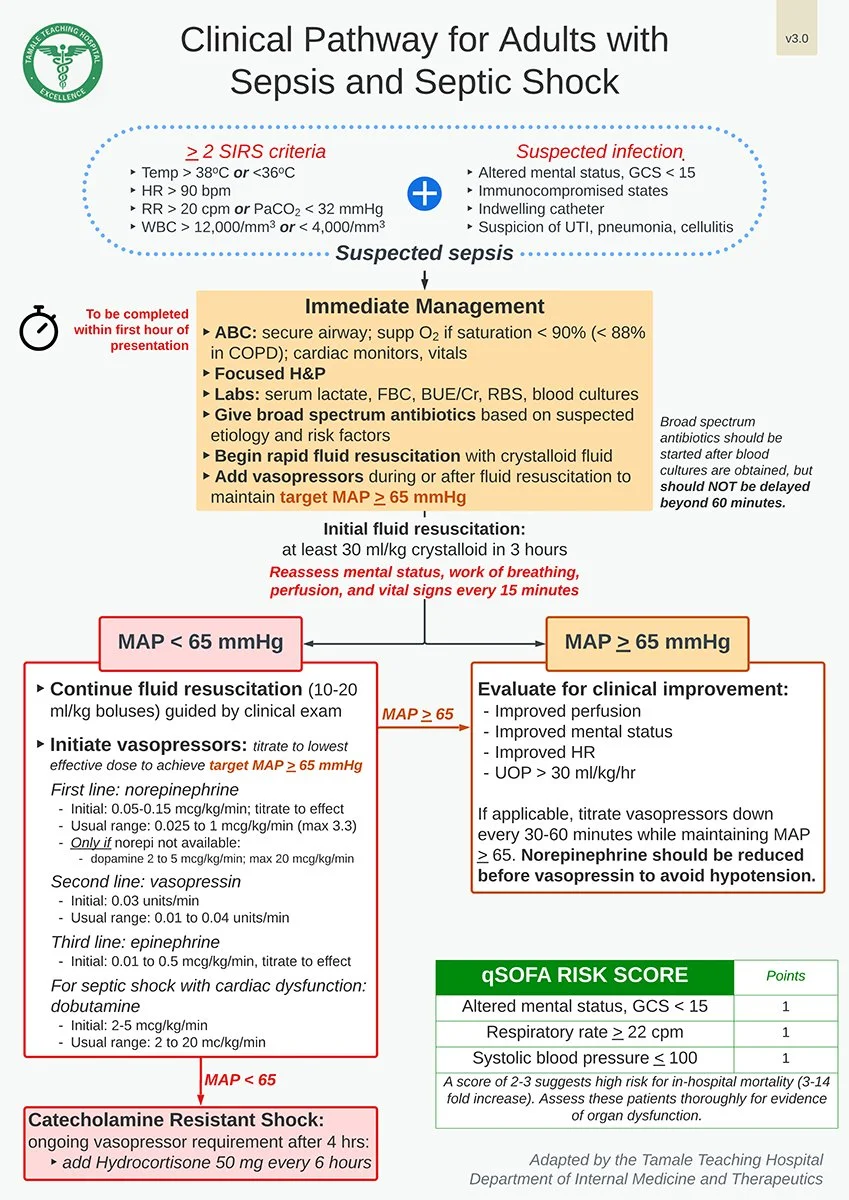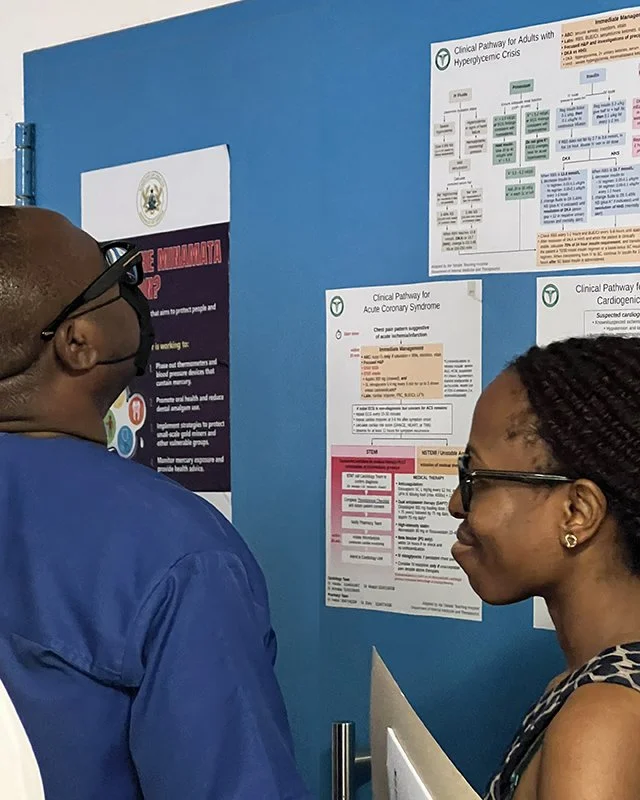Clinical Pathways Improve Care for Patients in Ghana
An example of a Clinical Pathway for sepsis and septic shock at TTH
Standardized guidelines for management of common medical conditions often include skills, medication and equipment that might not be available in low-resource settings. The team at AMPATH Ghana has launched a Clinical Pathways initiative to adapt current evidence-based guidelines into realistic and usable clinical algorithms for management of common illnesses at Tamale Teaching Hospital (TTH).
“These clinical pathways standardize care to make sure that patients who are coming in with different critical conditions are receiving evidence-based care that is available in this context,” said Claudia Leung, MD, who just completed two years as medicine-pediatrics team lead with AMPATH Ghana as a faculty member at New York University. “This process is helping to interpret some of these international guidelines based on the resources that are available locally including staffing, education and training levels, supplies, medications and infrastructure.”
For example, in a high-resource setting, care for a heart attack would likely include cardiac catheterization. However, in Ghana, medications are used instead to break-up clots in cardiac patients.
The Clinical Pathways effort started in the Department of Internal Medicine at TTH. Providers within the department agreed on several conditions such as cardiogenic shock, sepsis and acute coronary syndrome that were common but challenging to manage. Each pathway was assigned to an internal medicine physician or a specialist in the department who worked with medical officers to review the current literature and draft a clinical algorithm based on the available evidence and local resources. The resulting clinical pathways were all formatted in a common way and then presented to the entire department to ensure that everyone from entry level learners to specialists understood the pathway.
In Ghana, new doctors in their first two years of practicing are called house officers and they rotate through internal medicine, pediatrics, surgery and obstetrics and gynecology. Medical officers have completed this training but have not yet entered a residency program. TTH just received accreditation to start its first medicine residency program. During the visit from the accreditation committee, members of the committee noted the clinical pathways and their utility for other hospitals in Ghana.
The Clinical Pathways are posted in the hospital and shared through WhatsAppp.
The pathways are distributed via WhatsApp and are also posted in the hospital for easy reference. Each chart has an immediate management box that outlines the initial essential steps. Although the algorithms are designed to address the needs of about 80% of patients with a certain condition, there will also be more complex cases. The pathways can aid house officers and medical officers in identifying patients that require additional help from a specialist.
Dzifa Ahadzi, MBChB, FWACP, cardiologist and medicine lead for Clinical Pathways, said “The pathways provide ready guidance to manage critically ill patients and provide a standard of care for all cadres of doctors which is important given the limited numbers of specialists. I think that this could potentially evolve to provide management guidance for common medical problems amongst our populace, starting with emergencies and then evolving to guidance for chronic care. This could become a regional standard if we build capacity to train care providers in other facilities. The potential for national impact is also possible,” she continued.
Based on feedback on the initial set of 11 pathways, approximately 85% of respondents from the hospital said that they used the algorithms regularly. Similarly, 85% thought it significantly impacted patient care in a positive way. Medical officer Dr. Maaweh Awedaga Jacques said, “I have gained competence and confidence in managing those conditions. I always look at them to guide my management of such situations. I have no doubts or fears when faced with any condition which is included in the Clinical Pathways.” He cited an instance of a patient who was stabilized and able to go home within 24 hours of admission for a condition that would normally require a 3-day hospital stay.
Medical officer Dr. Joyce Bumbokuri agreed saying, “I have become more confident and solidly grounded in the management of certain specific cases like septic shock and cardiogenic shock. I can [also] confidently lead a team through a successful CPR without fear and doubts.”
”The printed copies everywhere are good for easy reference,” added Dr. Abena Otema Asiama-Kumi, senior house officer. “The Clinical Pathways initiative gives a simplified approach to a lot of possible medical scenarios. I can just access these algorithms easily to make a life changing decision for my patient.”
Dr. Leung said that the Clinical Pathways program continues to grow. “Many times in our morning conferences we'll talk about a challenge and then someone will say, ‘We need an algorithm for this. We need guidance.’ I think that has been a really important change in culture. And so now we're working on a second set of new algorithms.” The effort has expanded to include pediatrics, obstetrics and gynecology, surgery and pharmacy departments at TTH as well. A set of six pathways for management of chronic diseases such as diabetes, hypertension and depression is also in use in community facilities.
The Clinical Pathways effort presents an opportunity for other members of the AMPATH Consortium to lend their expertise to the AMPATH Ghana partnership. “One of the strengths of doing this within the AMPATH Global partnership is that this is a way to engage our short-term faculty who are in Ghana for a few weeks of clinical care or supervising residents. Residents who are coming who are interested in quality improvement work could also participate,” Dr. Leung said. “It's easy to see clinical needs here. It's very impactful to think about how to address a problem, help co-create an algorithm, and really impact care moving forward for many, many patients.”
“I think this unique partnership helps us to explore different means of strengthening patient care through the rich experiences of our collaborators who have worked in a similar context in Kenya,” added Dr. Ahadzi. “Co-leadership of all projects is commendable and a great way to boost confidence in local faculty to work towards lasting solutions for our context. I like the fact that sustainability is a core focus of all projects that AMPATH is working on.”


